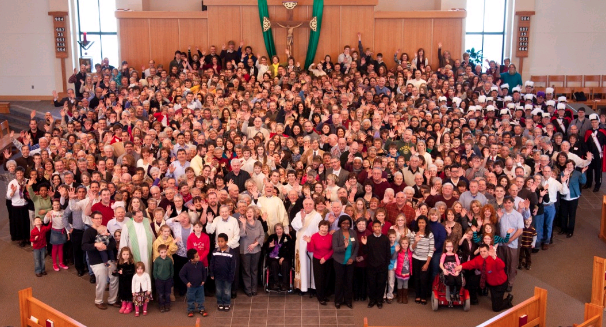Summary
In this final section of the introduction (para. 14-18), Pope Francis identifies the three audiences/settings of the New Evangelization and the seven themes that shape his vision of our particular chapter in the ongoing story of salvation.
These seven themes, and each of the three audiences/settings, will be explored in more detail as the document unfolds. Even though this section is a “nuts and bolts” summary of what Pope Francis will be proposing in Evangelii Gaudium, it isn’t lacking in material that both challenges us and invites reflection. While I am tempted to explore each of the three audiences here, they will be unwrapped as the document unfolds, so I will focus on the first one, as it gives us plenty to “sip” on for a daily meditation.
Reflection
There’s a real danger of imagining that the Gospel call and the New Evangelization is about “those people out there.” And yet, for Pope Francis, the first setting of the New Evangelization is the local parish and it’s first audience is most of the people reading this series - it’s us! By us, I am presuming you are an “intentional disciple” (1) whose life is marked by “full, active and conscious” participation in the Mass (2) while flourishing in and sharing your particular charisms with the Body of Christ (3). That’s a tall order, I know, but that should be ordinary Christian living.
Even when we are doing all that, we are still the object of the New Evangelization. Conversion is an ongoing process, an organic growth that we have to constantly cultivate and engage. As Pope Benedict remarked a few years ago, if we are not advancing in the spiritual life, we are, by default, regressing. If the Gospel is at it’s heart a relationship with a Person, Jesus Christ, then it naturally has to be engaged daily like a healthy marriage. The central place that relationship is strengthened and nourished is the parish setting where we meet Christ in Word, Sacrament, and in each another. By the way, this was the topic of Pope Francis’s first Sunday of Advent homily for a suburban Roman parish (see http://www.catholicnewsagency.com/news/christian-life-is-a-path-of-encountering-jesus-preaches-pope/ )
Response
With this in mind, take a few moments today to make a clear-eyed assessment of your engagement with your local parish community. Are you welcoming Christ fully in Word and Sacrament so you are continually growing in the exercise of your gifts and your confidence and joy while sharing the Gospel? Consider some simple changes like arriving at Mass early so you can recollect your heart to receive all the graces the Mass offers. Take a few minutes in Lectio Divina on the scriptural readings of the day “to prime the pump” of your heart for their proclamation and exposition by our clergy (the Pope is counting on our clergy being “animated by the fire of the Spirit, so as to inflame the hearts of the faithful” (para. 15). If you find your mind wandering in the liturgy, establish a “wakeup” word or phrase that draws your heart back into the moments of the Mass. I use very simple ones like “Jesus” or “I love you, Lord help me to love you more.”
Have you discovered and deployed your particular charisms? This is one of the most important ways we can take up Pope Francis’s invitation here to “grow spiritually so that [we] can respond to God’s love even more fully in [our] lives (para.15). If you don’t know what your charisms are, seriously consider discerning, discovering and deploying them. Your particular parish desperately needs them, and you were given them for that community. You owe it to your brothers and sisters to do this. My life was transformed when I discovered and started living in my charisms. A great place to start is www.siena.org
Pope Francis reminds us we must be vigilant and continually open to the Gospel, even as seasoned disciples. The daily prayer that Pope Francis offered in para. 3 is one of my morning renewal prayers now, like Kelly, to also help me be attentive to that. When we do this, we are equipped to faithfully and fruitfully share the Gospel to the other two audiences (the baptized but not evangelized, and those who don’t yet have the gift of faith).
(1) What in the world is an “intentional disciple”? See Sherry Weddell’s Forming Intentional Disciples. This should be on every Catholic bookshelf.
(2) Sacrosanctum Concilium. para. 14.
(3) Catechism of the Catholic Church, Nos. 798-801.



